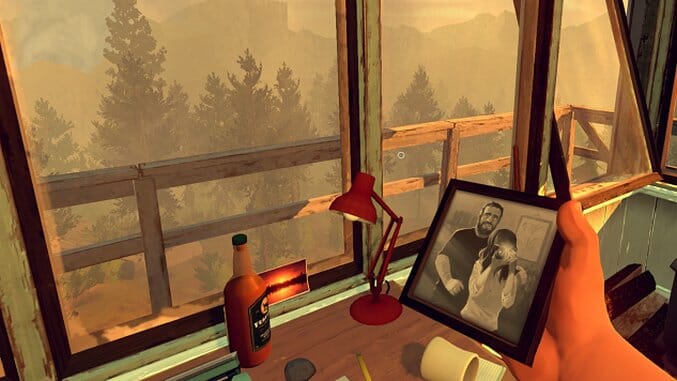How Firewatch Illustrates The Tragedy Of Inconvenient Love

I was sitting on my couch with a friend, huddled over her ancient laptop when I heard the song “Someone Like You” by Adele. She was performing at the Brit Awards in 2011 and this fuzzy YouTube video was the first time I’d ever seen her sing.
The song is brutal, devastating to anyone who has felt the sting of saudade. As she performs the pain in her eyes is evident with each emotional swell of her voice and you can feel her loss through the computer screen, thousands of miles away. We both watched as her face trembled, and she warbled with her tremendous powerhouse of a voice,
Nevermind I’ll find
Someone like you
I wish nothing but the best
For you, too
Don’t forget me, I begged
I remember you said,
“Sometimes it lasts in love, but sometimes it hurts instead.
As the song ended we were both in tears. I turned to her and said, “I’ve never heard a song that encouraged me to handle a breakup so graciously.” She nodded. “I’ve never been taught to let go, only to hold on. Whether the person I was with wanted me to or not.”
Adele’s response to love lost is one that you don’t hear very often, especially in pop culture. Fiction is rife with imagery of persistent lotharios, lovelorn damsels, tragic characters whose very existence is framed on their inability to move on. Not often are we asked to accept that some loves are inconvenient and not meant to be. Usually entertainment serves the fantasy of romantic wish fulfillment, a longing for the ways we wish things would be.
Firewatch recently debuted to strong reviews, affecting critics from many different social circles across the gaming community. There are many themes to unpack in the Wyoming-set mystery game, from loss of intimacy to isolation and deception, to heterosexual friendship and unrequited love. The protagonist Henry has escaped to the wilderness, taking a job as a park ranger to avoid the reality that his wife Julia has succumbed to early onset dementia. His boss Delilah, an alcoholic stationed in a distant watchtower, self isolates even as she is desperately lonely. Their dynamic, facilitated only by sporadic conversations on their walkie-talkies, is immediately sarcastic but imbued with unique energy, the kind sparked by equal parts attraction and boredom.
The dialogue of Firewatch plays out as multiple choice. With each conversation the player is given the option of how to progress the banter. Frequently they are invited to participate in the fragile process of vulnerability extended and returned. Over the summer, unsettling events start to occur. Henry and Delilah begin to bond over their personal lives and the drama unfolding in the forest. Henry tries to process his guilt over abandoning his sick wife. Delilah shares her regrets over the disappearance of a young boy. But as a mystery starts to unfold, one that could result in serious legal implications for them both, Henry and Delilah are drawn closer together even as fear and paranoia threaten to drive them apart.
As the tension of the game heightens, you begin to wonder, will these two end up together? Should they? When two people bond over self imposed exile and pain, can there be such a thing as platonic love?
![]()
One major flaw in the popular depictions of relationships in entertainment is that the audience is rarely offered an example of how to deal with the end of a romance gracefully. So often the focus is on passion and the willingness to “do anything” for the person you love, at the expense of convenience and, sometimes, personal well being. While themes of self sacrifice predominate in love stories across all mediums, relying on an idealistic commitment to “love at all costs,” rarely do they center on making the “right decision.” But human beings are highly adaptive creatures, referencing their surroundings and the relationships within them as a plumb line for what their own should look like. The end result is that we do not know how to make decisions within a romantic relationship that aren’t ultimately centered on selfish motivation. We’re not given the tools to know when to let go.
Henry and Delilah’s repertoire is witty and fast paced. Anyone who has encountered that kind of spark can sense it. It’s the kind that gets your blood racing and your thoughts pulsing when you’re in the moment. But despite any vulnerability you may exchange with Delilah when you’re playing as Henry, it always ends the same. Ultimately she realizes pursuing a romance between them would be foolish. Delilah withdraws as the game comes to a close. She does so passive aggressively, misleading Henry at the last second and slipping away in a tepid confrontation that leaves little significant resolution.